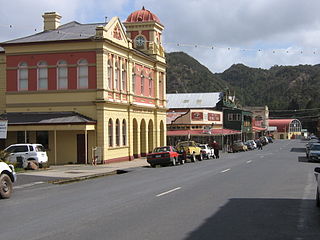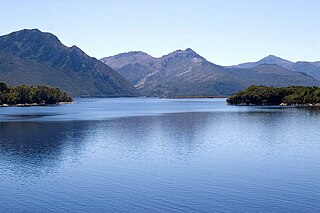
Hobart is the capital and most populous city of the Australian island state of Tasmania. Home to almost half of all Tasmanians, it is the least-populated Australian state capital city, and second-smallest if territories are taken into account, before Darwin, Northern Territory. Hobart is located in Tasmania's south-east on the estuary of the River Derwent, making it the most southern of Australia's capital cities. Its skyline is dominated by the 1,271-metre (4,170 ft) kunanyi/Mount Wellington, and its harbour forms the second-deepest natural port in the world, with much of the city's waterfront consisting of reclaimed land. The metropolitan area is often referred to as Greater Hobart, to differentiate it from the City of Hobart, one of the five local government areas that cover the city. It has a mild maritime climate.

Queenstown is a town in the West Coast region of the island of Tasmania, Australia. It is in a valley on the western slopes of Mount Owen on the West Coast Range.

Zeehan is a town on the west coast of Tasmania, Australia 139 kilometres (86 mi) south-west of Burnie. It is part of the West Coast Council, along with the seaport Strahan, and neighbouring mining towns of Dundas, Rosebery and Queenstown.
The Lake Margaret Power Stations comprise two hydroelectric power stations located in Western Tasmania, Australia. The power stations are part of the King – Yolande Power Scheme and are owned and operated by Hydro Tasmania. Officially the Upper Lake Margaret Power Station, a conventional hydroelectric power station, and the Lower Lake Margaret Power Station, a mini-hydroelectric power station, the stations are generally collectively referred to in the singular format as the Lake Margaret Power Station. The stations are located approximately 2.5 kilometres (1.6 mi) apart.
The North Mount Lyell disaster refers to a fire that broke out on 12 October 1912 at the Mount Lyell Mining and Railway Company operations on the West Coast of Tasmania, killing 42 miners. The mine had been taken over from the North Mount Lyell Company in 1903.

Mount Owen is a mountain directly east of the town of Queenstown on the West Coast Range in Western Tasmania, Australia.

The Queen River, part of the King River catchment, is a minor perennial river located in the West Coast region of Tasmania, Australia.

Strahan Airport is an airport located 2 nautical miles west of Strahan, Tasmania, Australia. It is the main airport for the West Coast of Tasmania, and is owned and maintained by the West Coast Council. The need for an airport in the area was suggested in the 1950s, and suggestions for upgrades have occurred over time.
The mines of the West Coast of Tasmania have a rich historical heritage as well as an important mineralogical value in containing or having had found, specimens of rare and unusual minerals. Also, the various mining fields have important roles in the understanding of the mineralization of the Mount Read Volcanics, and the occurrence of economic minerals.

TheMercury is a daily newspaper, published in Hobart, Tasmania, Australia, by Davies Brothers Pty Ltd (DBL), a subsidiary of News Corp Australia, itself a subsidiary of News Corp. The weekend issues of the paper are called Mercury on Saturday and Sunday Tasmanian. The current editor of TheMercury is Craig Warhurst.
The Strahan–Zeehan Railway, also known as the "Government Railway", was a railway from Strahan to Zeehan on the west coast of Tasmania.
7XS is a radio station based in Queenstown, Tasmania, Australia, broadcasting on the FM radio band on a frequency of 92.1 MHz Queenstown, 105.1 MHz Strahan and 107.1 Rosebery on the west-coast of Tasmania.

Queenstown Oval, known colloquially as The Gravel or The Rec, is a sports arena in Queenstown, located on the west coast of Tasmania. Built in 1895, it is infamous for its gravel playing surface, and is used primarily for Australian rules football, while also hosting cricket and athletics. The ground has a main concrete grandstand and a total capacity of 5,000.
The Unconformity is an arts festival held in Queenstown, Tasmania in Australia.
Lou Rae is a Tasmanian author and historian of the West Coast of Tasmania.

Hobart City Hall is a public auditorium and concert venue in Hobart, Tasmania, which together with the Derwent Entertainment Centre forms one of the two major public venues in the city. It is also a commonly used emergency center during disasters such as the 2013 Tasmanian bushfires. Despite its name it is not the City of Hobart's seat of government, which is Hobart Town Hall – historically a matter of confusion.

Queenstown Post Office is a heritage-listed post office at 32-34 Orr Street, Queenstown, Tasmania, Australia. It was designed by the Tasmanian government's Public Works Office and built in 1902, with the tower added in 1909. It was added to the Australian Commonwealth Heritage List on 22 June 2004.
The COVID-19 pandemic in Tasmania is part of the ongoing worldwide pandemic of the coronavirus disease 2019 caused by severe acute respiratory syndrome coronavirus 2.

The State Cinema is a historic cinema venue located in North Hobart, Tasmania. It was acquired by the US-owned Reading Cinemas chain in November 2019.

The Odeon Theatre is a historic live entertainment venue and former cinema in the city of Hobart, Tasmania, Australia.













